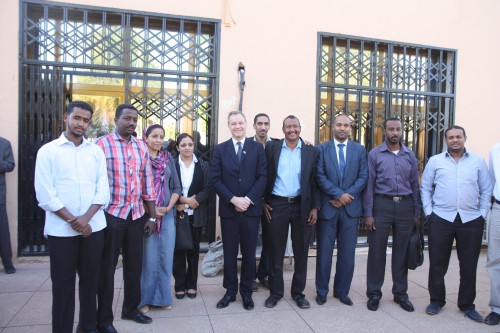27th January 2014
Minister of Africa visit to Sudan
Last week Mr Mark Simmonds came to stay. He is the Minister for Africa in the Foreign Office. He spent two days here meeting Government Ministers and senior Officials, representatives from several political parties, civil society and the business community. He also squeezed in time for a brief sunset boat trip on the Nile.
There were two themes to the visit. One was about Sudan’s role in the region. The other was about Sudan itself. On the regional agenda, there was of course a great deal of discussion about South Sudan. This was an opportunity for the UK and Sudan to discuss the crisis there. No country knows South Sudan better than Sudan. And the UK too has a long historical association with Sudan/South Sudan and played a significant role in the process that led to the independence of South Sudan.
In different ways we are taking the same approach to the current crisis: supporting the IGAD initiative (Sudan from within, the UK externally), encouraging the two sides to agree a ceasefire and to open negotiations. As President Bashir said in Juba, the only way to solve this is through dialogue, not fighting.
Mr Simmonds acknowledged and endorsed the responsible position Sudan has taken in its approach to South Sudan and recognised the great concern that many Sudanese understandably feel about the potential impact of events there on Sudan itself.
He also discussed a number of other regional issues (Somalia, Central African Republic) on which Sudan has expertise and is playing a role.
Of course Mr Simmonds spent most of his time in Sudan talking about Sudan. He discussed with the Sudanese people he met the two big issues that are on most peoples’ minds at the moment: political reform and the economic challenges. There is widespread agreement here on the need for a National Dialogue to address some pressing political and constitutional issues. There also seems to be agreement that this needs to be wide-ranging and inclusive, bringing in groups from across the political spectrum and beyond, including rebel groups providing they agree to stop fighting. Mr Simmonds heard from several Parties, who have their own proposals.
But so far there has not been much progress on any of this. The election timetable approaches. And the underlying issues remain: particularly the need to create a political environment in which civic and human rights are respected, people are free to speak, organise, meet and publish without fear of reprisals, and all political parties feel able to compete from a position of equality in free and fair elections.
Mr Simmonds was briefed on the disturbing trends on some of these issues and raised our concerns; in particular reiterating our shock at the response by the security authorities to the demonstrations last September.
It’s hard to visit Sudan without being aware of the economic challenges the country faces. There were bread and fuel shortages in Khartoum while he was here. And he heard about the acute conditions of economic need in which millions of Sudanese live.
Against this background, he was asked a lot about the UK approach to debt relief for Sudan. As he made clear, we encourage Sudan through a process that will lead to debt relief. That process is the Heavily Indebted Poor Countries (HIPC) initiative. In order to qualify all countries must take concrete action to tackle poverty, in particular allocating government money to services such as health and education, which benefit the people. This is not just necessary in order to get debt relief. It is the right thing to do. Sudan has put some of the building blocks in place but has a long way to go. As Mr Simmonds said “the ball is in Sudan’s court”.
One cause of poverty is conflict. Mr Simmonds raised our concerns about the increase in conflict, and displacement of local people, in Darfur and the situation in Blue Nile and South Kordofan. We continue to believe that the Doha process offers the best way forward on Darfur, provided all sides deliver on their commitments and the rebel groups who have yet to do so sign up. On South Kordofan and Blue Nile the Government reiterated its willingness to restart negotiations with the SPLM (N). Meanwhile, the fighting and bombings continue and humanitarian access, for which Mr Simmons pressed, remains restricted.
One of Sudan’s strengths is its people. Mr Simmonds had the opportunity to meet some of the competitors in the “Mashrouy” project, which the UK initiated and supported, together with the Sudanese private sector. He met young people brimming with creativity and enthusiasm, keen to develop their business ideas. The final airs on Blue Nile TV on 30 January. Don’t miss it!
